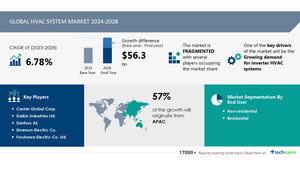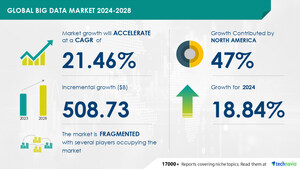NEW YORK, July 16, 2024 /PRNewswire/ -- The global agriculture market size is estimated to grow by USD 23.5 billion from 2024-2028, according to Technavio. The market is estimated to grow at a CAGR of 5.97% during the forecast period. High growth potential for agricultural exports is driving market growth, with a trend towards growing use of robots in agriculture. However, declining availability of arable land poses a challenge. Key market players include Afimilk Ltd., Bayer AG, Compagnie Financiere et de Participations Roullier, Deere and Co., DeLaval International AB, GEA Group AG, Molino agro SA, Sumitomo Corp., Topcon Corp, and Trimble Inc..
Get a detailed analysis on regions, market segments, customer landscape, and companies - Click for the snapshot of this report
Forecast period |
2024-2028 |
Base Year |
2023 |
Historic Data |
2017 - 2021 |
Segment Covered |
Crop Type (Soya bean, Maize, Wheat, and Others), Type (Conventional and Organic), and Geography (South America) |
Region Covered |
Argentina |
Key companies profiled |
Afimilk Ltd., Bayer AG, Compagnie Financiere et de Participations Roullier, Deere and Co., DeLaval International AB, GEA Group AG, Molino agro SA, Sumitomo Corp., Topcon Corp, and Trimble Inc. |
Key Market Trends Fueling Growth
In recent years, the agriculture market in Argentina has seen a rise in the adoption of robots for farming tasks. Equipped with specialized tools and automated systems, these robots offer improved accuracy and efficiency. They perform harvesting using automated systems, maintain soil humidity with mobile robots, and protect crops from insects with automated controllers. Robots work longer hours and provide precise responses, enabling farmers to monitor crop status, production levels, and development. Additionally, they offer precise control over sowing and harvesting applications. Consequently, the use of advanced robots in smart farms is expected to boost the agriculture market's growth during the forecast period.
Agriculture markets are witnessing notable trends in various crops, including cauliflower, nuts, and alfalfa. To boost international competitiveness, standardizing export taxes and focusing on added-value products are essential. Employment opportunities can be created through domestic production, especially with the adoption of new technologies like precision farming, improved seeds with genetically modified traits, notillage farming, and innovative farming practices. Risk management, soil sustainability, carbon fixation, and grasses are crucial for long-term agricultural success. Soil erosion and wind erosion are significant challenges, requiring attention. Biotic and abiotic stresses also impact production, making it essential to invest in research and development. South American producers, such as sunflower growers, face competition from wheat exporters like Ukraine. Macroeconomic instability and credit shortages can impact global exports. Post-harvest losses are a concern, highlighting the need for logistics services and infrastructure improvements. Drought is a recurring issue, necessitating the use of silos for storage. Innovations like genetically engineered crops, such as HB4 sunflowers, can increase wheat production. New technologies, like precision farming and improved seeds, can help mitigate the impact of drought. Overall, the agriculture sector must adapt to these trends and challenges to remain competitive.
Discover 360° analysis of this market. For complete information, schedule your consultation- Book Here!
Market Challenges
- The decline in Argentina's arable land for crop cultivation is a significant concern for the agriculture market. Over the last few decades, industrialization, urbanization, and energy demands have led to the conversion of fertile land for non-agricultural purposes. Soil erosion and pollution have further reduced the quality and productivity of agricultural land. Plowing, a crucial agricultural process, has become less effective due to these issues. Consequently, crop production has decreased, limiting agricultural activities and potentially hindering the growth of Argentina's agriculture market during the forecast period.
- Agriculture market faces several challenges in producing and supplying various crops like Potatoes, Tomatoes, Domestic consumption favorites Fresh Oranges, and more. The World Bank provides loan facilities through Climatesmart for farmers to adopt innovative practices in the Agri-food system. Climateresilient infrastructure is crucial for growing crops like Coffee, Soy-based crops, and Off-season varieties of Carrots, Peppers, Chilies, Beans, Turnips, Oranges, Peaches, Avocados, Strawberries, and Fresh vegetable segments. The Health consciousness trend impacts demand for Organic food, leading to a surge in Genetically modified seeds for crops. The Pandemic effect and Chronic diseases like Cancer, Hypertension, and Diabetes necessitate Government agencies to implement Agricultural policies, offering Technical assistance and Value chains support. Export taxes on Specialty crops like Blueberries and Broccoli hinder growth, while Agricultural R&D and Extension services are essential for improving Crop production. INTA and other organizations provide vital assistance in implementing sustainable farming methods.
For more insights on driver and challenges - Download a Sample Report
Segment Overview
This agriculture market report extensively covers market segmentation by
- Crop Type
- 1.1 Soya bean
- 1.2 Maize
- 1.3 Wheat
- 1.4 Others
- Type
- 2.1 Conventional
- 2.2 Organic
- Geography
- 3.1 South America
1.1 Soya bean- The agriculture market experiences consistent growth due to increasing demand for food products worldwide. Farmers sell their produce to wholesalers, who then distribute it to retailers and supermarkets. Technology plays a crucial role, with innovations like precision farming and automated irrigation systems improving productivity. Government policies and subsidies also support farmers, ensuring a stable market. Overall, the agriculture market is a vital sector, providing food security and economic opportunities.
For more information on market segmentation with geographical analysis including forecast (2024-2028) and historic data (2017 - 2021) - Download a Sample Report
Learn and explore more about Technavio's in-depth research reports
The global Smart Agriculture, Precision Agriculture, and Connected Agriculture markets are experiencing rapid growth driven by technological advancements. Smart Agriculture leverages IoT, AI, and data analytics to optimize farming practices. Precision Agriculture focuses on enhancing crop yields and resource efficiency through GPS, sensors, and automated systems. Connected Agriculture integrates these technologies to create a cohesive, data-driven agricultural ecosystem. Key players are investing in innovative solutions to address the growing demand for sustainable and efficient farming practices, positioning these markets for significant expansion in the coming years.
Research Analysis
The agriculture market has experienced significant shifts in consumption, export, and import trends in recent years. The global wheat crop production reached a record high of 762.4 million metric tonnes in 2020, with consumption at 757.9 million metric tonnes. Wheat averages USD210 per metric tonne. Supply and distribution have been impacted by the pandemic, leading to disruptions in export and import markets. Fruits such as grapes, bananas, apples, limes, lemons, pears, oranges, peaches, avocados, and strawberries are major fresh vegetable segments with high demand. The pandemic effect has led to an increase in organic food demand as consumers prioritize healthier options. Chronic diseases and cancer have also fueled the demand for organic produce. Import and export analysis of these fruits reveal significant trade flows between countries. For instance, Mexico is the largest exporter of limes and avocados, while China is the largest importer of soybeans and wheat. The organic food market is expected to grow at a CAGR of 20.4% from 2021 to 2026. Other vegetables like onions, carrots, peppers, chilies, beans, turnips, and oranges also have a substantial market presence.
Market Research Overview
The Agriculture Market is a dynamic and complex system that involves the production, consumption, import, and export of various crops and commodities. Consumption Analysis reveals that wheat, with an average yield of metric ton per hectare, remains a staple food in many countries. The Agri-food system is undergoing green development with innovative practices like climateresilient infrastructure and the use of genetically modified seeds. The World Bank provides loan facilities through programs like Climatesmart to support farmers in adopting sustainable practices. Export Analysis shows that countries like India, China, and Brazil dominate the export of crops such as coffee, soy-based crops, and grapes. Import Analysis reveals that countries import fruits like bananas, apples, and citrus fruits from various origins. Domestic consumption of fresh oranges, apples, and tomatoes is significant, with the pandemic effect leading to a surge in demand for organic food. Government agencies and international organizations provide technical assistance, agricultural policies, and value chains to improve the competitiveness of the agricultural sector. New technologies like precision farming, improved seeds, and notillage farming are being adopted to increase domestic production and employment. Risk management and soil sustainability are crucial aspects of the agricultural sector, with a focus on carbon fixation and soil erosion prevention. The health consciousness trend has led to an increase in demand for fresh vegetables like carrots, peppers, chilies, beans, turnips, and off-season varieties of fruits like strawberries, peaches, avocados, and blueberries. The demand for added-value products like nuts, alfalfa, and specialty crops like broccoli, cauliflower, and cauliflower is also on the rise. Export taxes and standardized export tax policies are essential to ensure international competitiveness. The agricultural R&D and extension services sector plays a crucial role in developing new technologies and innovative farming practices to increase productivity and efficiency. Employment in the agricultural sector is significant, with a focus on risk management and improved livelihoods for farmers. In conclusion, the Agriculture Market is a complex system that requires a holistic approach to ensure food security, sustainable production, and economic growth. The use of new technologies, innovative farming practices, and sustainable infrastructure are crucial to addressing the challenges of climate change, population growth, and health concerns. Government policies, international cooperation, and private sector investment are essential to ensure the long-term sustainability and competitiveness of the agricultural sector.
Table of Contents:
1 Executive Summary
2 Market Landscape
3 Market Sizing
4 Historic Market Size
5 Five Forces Analysis
6 Market Segmentation
- Crop Type
- Soya Bean
- Maize
- Wheat
- Others
- Type
- Conventional
- Organic
- Geography
- South America
7 Customer Landscape
8 Geographic Landscape
9 Drivers, Challenges, and Trends
10 Company Landscape
11 Company Analysis
12 Appendix
About Technavio
Technavio is a leading global technology research and advisory company. Their research and analysis focuses on emerging market trends and provides actionable insights to help businesses identify market opportunities and develop effective strategies to optimize their market positions.
With over 500 specialized analysts, Technavio's report library consists of more than 17,000 reports and counting, covering 800 technologies, spanning across 50 countries. Their client base consists of enterprises of all sizes, including more than 100 Fortune 500 companies. This growing client base relies on Technavio's comprehensive coverage, extensive research, and actionable market insights to identify opportunities in existing and potential markets and assess their competitive positions within changing market scenarios.
Contacts
Technavio Research
Jesse Maida
Media & Marketing Executive
US: +1 844 364 1100
UK: +44 203 893 3200
Email: [email protected]
Website: www.technavio.com/
SOURCE Technavio

WANT YOUR COMPANY'S NEWS FEATURED ON PRNEWSWIRE.COM?
Newsrooms &
Influencers
Digital Media
Outlets
Journalists
Opted In




Share this article